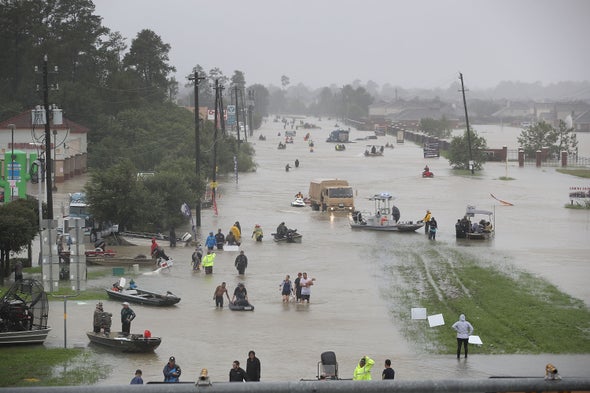Climate change made Hurricane Harvey more powerful and increased its deadly flooding, according to new research released as major storms may be driving more Americans to worry about global warming.
Human-caused climate change caused the storm to drop significantly more rain than storms would have before atmospheric carbon dioxide levels spiked from the consumption of fossil fuels, according to research published yesterday. Meanwhile, a new poll suggests that witnessing that type of damage and the suffering of those affected has also seemed to move public opinion slightly toward an acceptance of the risk that it poses to a large segment of the U.S. population.
Before the storm, climate scientists speculated global warming could intensify climate change. They pointed to a warmer atmosphere, which carries more water vapor to worsen rainstorms, as well as to higher ocean surface temperatures, which intensify hurricanes.
Hurricane Harvey's record rainfall was three times more likely than a storm from the early 1900s and 15 percent more intense as a result of climate change, a new study in Environmental Research Letters found.
"The takeaway from this paper is that Harvey was more intense because of today's climate, and storms like Harvey are more likely in today's climate," said Antonia Sebastian, a study co-author and a researcher with Rice University's Severe Storm Prediction, Education and Evacuation from Disasters Center. "It highlights the need to consider that our hazards are changing over time and that we should be considering those changes in the design of our infrastructure."
The research released yesterday shows that human-caused climate change will worsen storms. Harvey made landfall near Corpus Christi in late August and stalled for days, dropping more than 30 inches of rain on southeast Texas. In one area, Harris County, 51.89 inches of rain fell.
The seven-day rainfall total from Harvey was as much as 40 percent higher than rainfall from a similar storm would have been decades ago, before human activity caused atmospheric carbon dioxide levels to spike, according to a study published yesterday in Geophysical Research Letters. Researchers accounted for human influence on climate by estimating the present-day chances of Harvey's rainfall totals and then comparing them with 1950s greenhouse gas levels. Researchers expected to find a 6 percent increase in Hurricane Harvey rainfall totals, but instead found that climate change increased those totals by at least 19 percent and as much as 38 percent.
The two papers released yesterday follow research published last month in the Proceedings of the National Academy of Sciences that found that human activity could make another Hurricane Harvey far more likely. The earlier paper found that the odds of a Hurricane Harvey level of rainfall could increase to 1 in 100 by 2100, up from 1 in 2,000 at the beginning of the 21st century.
The findings across three independent research papers show that human activity did increase the damage inflicted by Hurricane Harvey, said Michael Wehner, a researcher at Lawrence Berkeley National Laboratory.
"The three papers come to perhaps different numbers, but we're all within uncertainty ranges, well within them, and lends confidence to the statement that there was a significant human influence on the amount of precipitation that was produced by Hurricane Harvey," he said.
Regardless of how closely they pay attention to scientific revelations about climate change and its connections to hurricanes, voters are increasingly worried about climate change, according to a new poll from the Yale Program on Climate Change Communication released yesterday.
Seven in 10 voters think global warming is happening, though only 54 percent attribute it to human activity. However, a record proportion of voters, 63 percent, are now worried about global warming, an increase of 8 percent since May, the poll found. That number even increased among Republicans, whose acceptance of basic climate science dropped after President Trump's election, but then spiked after the hurricane season. That rise in concern about climate change climbed over the summer as televisions blared images of flooded neighborhoods in Texas and Florida from Hurricanes Harvey and Irma as well as burning homes from California wildfires fueled by drought.
Americans have become more convinced that they themselves are threatened by global warming, as well as their families and communities, said Anthony Leiserowitz, the Yale program's director. They still tend to think of climate change as having a more distant impact, in other countries, but the events of this summer are convincing more people that climate change is already happening here, he said.
"It's seen as more of a personal local and national threat where Americans are at greater risk," he said. "Substantial proportions literally say that they believe global warming made specific extreme weather events worse, such as Harvey and Irma and Maria, such as wildfires out West, such as the extreme heat wave that grounded planes in Phoenix."
There was much public debate about the role of climate change in the aftermath of Harvey, and many Republicans were quick to dismiss links to global warming, pointing out that states like Florida and Texas have a long history with deadly storms. Rep. Brian Babin (R-Texas), who sits on the House Science, Space and Technology Committee and has rejected the mainstream scientific view that humans are the primary driver of climate change, was trapped in his Houston house by Harvey's floodwaters.
U.S. EPA Administrator Scott Pruitt said it was insensitive to discuss climate change as Hurricane Irma bore down on Texas.
"To have any kind of focus on the cause and effect of the storm versus helping people, or actually facing the effect of the storm, is misplaced," he told CNN at the time.
Reprinted from Climatewire with permission from E&E News. E&E provides daily coverage of essential energy and environmental news at www.eenews.net.


